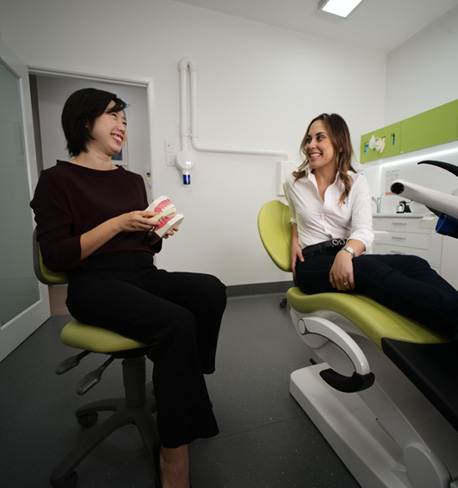
Sedation Dentistry
Book a check-up- Home
- Treatments
- Anxious Patients
- Sedation Dentistry
Sedation Dentistry
Sedation Dentistry West End
SOLVING THE COMMON PROBLEM OF DENTAL ANXIETIES
Nitrous oxide “happy gas” is used as a relaxing treatment that is inhaled through a small mask that fits over your nose. It is used for patients who have anxieties or are unnerved about having dental treatment.
Why do we offer sedation?
We know that a lot of patients feel anxious and unrelaxed when they are told they need to have a dental procedure. To give you the most comfort, we provide ‘Happy Gas’ which helps you to relax, making the treatment go as smoothly as possible.
What will I feel when I get sedated?
Once the mask has been placed over your nose, the dentist will ask you to breathe normally. You should start to feel the effects of the happy gas in the first few minutes.
Some people say that when they are sedated, their hands, arms or legs tingle or they feel light-headed. The main aim is to calm you down and feel relaxed. Some people say it gives them the giggles, which is where it got its nickname ‘happy gas’ from. All these feelings will start to reduce once the mask has been removed from your nose.
The feelings of happy gas will change for each individual.
Is sedation safe?
Nitrous is a mix of nitrogen and oxygen, which is both safe and effective. Sedation does not aim to put you to sleep but to ease your anxieties and to be able to relax. You will be able to see and hear everything going on around you, allowing to communicate with the dentist and follow any instructions. You will be able to breathe normally through your nose, and you will not be left with any effects of the happy gas once the mask has been removed.
Happy gas is safe, easy to administer and does not stay in the body.
Sedation Services West End
At My Dental Care @ West End, we provide a sedation service. Contact us today and take that step towards improving your smile and overall oral health.
All surgical procedures carry risks. Before proceeding, you should seek a second opinion from an appropriately qualified health practitioner.
Frequently asked Questions
Is dental sedation right for me?
Deciding whether dental sedation is right for you depends on several factors, including your personal preferences, medical history, and the nature of the dental procedure. Dental sedation can be beneficial for individuals who experience dental anxiety, have a strong gag reflex, have difficulty sitting still for long periods, require extensive dental work, or have a low pain threshold. It can also be helpful for patients with certain medical conditions that may make dental procedures more challenging.
To determine if dental sedation is suitable for you, it’s essential to consult with your dentist or oral surgeon. They will evaluate your medical history, assess the complexity of the procedure, and discuss your anxiety levels or specific concerns. They can then recommend the appropriate level of sedation that will ensure your comfort and safety during the dental treatment.
What are the side effects or risks?
Dental sedation, when performed by qualified professionals, is generally safe. However, it’s essential to understand the potential side effects, including temporary drowsiness, dizziness, and allergic reactions. There is a slight risk of respiratory complications and interactions with medications. Nausea or vomiting may occur, and a short recovery period is necessary. By openly discussing your medical history and concerns with your dentist, you can minimise risks and ensure a safe and comfortable sedation experience.
How do you prepare for dental sedation?
To prepare for dental sedation:
- Consult with your dentist and provide a detailed medical history.
- Follow any pre-sedation instructions given, such as fasting.
- Arrange for someone to drive you home after the procedure.
- Discuss post-sedation care instructions with your dentist.
- Wear comfortable clothing on the day of the procedure.
- Communicate any concerns or questions to your dental team.
By following these steps, you can ensure a safe and comfortable dental sedation experience.
What is needle free numbing (the Wand)?
The Wand is a computer-assisted local anaesthetic system designed to make numbing significantly more comfortable—especially for patients who feel anxious about needles. Although it still uses an extremely fine needle, the key difference is that the anaesthetic is delivered by a computer rather than by hand. This allows the anaesthetic to flow at a slow, steady, and controlled rate, reducing the pressure and discomfort that people often associate with traditional injections.
Most patients describe the sensation as virtually painless, and many don’t even realise the numbing has already begun. The Wand also looks more like a small pen than a syringe, which can help ease anxiety for those who are nervous around needles.
Can I bring my own coping tools to the clinic?
Yes, absolutely. You’re welcome to bring anything that helps you feel more at ease during your visit. We also offer a range of in-clinic comfort tools to support anxious patients, including:
- Weighted blankets
- Stress toys
- Headphones and an adaptor so you can listen to your own music or calming audio
- Visits from our therapy dog on selected days
- Dental Assistants trained in gentle distraction techniques to help you stay relaxed during numbing
Our goal is to create a calm, supportive environment where you can feel completely comfortable throughout your appointment.
How can I manage dental anxiety without sedation?
Dental anxiety can be managed through several non-sedation methods. Techniques such as deep breathing exercises, visualisation, and mindfulness can help calm your nerves. Bringing a friend or family member for support, listening to music or an audiobook, and discussing your fears with your dentist can also reduce anxiety. Some dental practices offer amenities like warm blankets and aromatherapy to create a more comfortable environment. Cognitive-behavioural therapy (CBT) is another effective approach that helps address and alter negative thought patterns related to dental visits.
How does nitrous oxide (Happy Gas) work during sedation?
Once the mask is placed over your nose, you breathe normally through your nose and begin to feel relaxed within minutes. Some patients experience tingling, light-headedness or even giggles, which is why it’s nicknamed “happy gas.” Effects quickly wear off after the mask is removed.
Is sedation dentistry safe for people with severe dental phobias?
Sedation dentistry is generally safe for people with severe dental phobias. Dentists thoroughly evaluate your medical history and current health status to determine the appropriate level of sedation. There are different levels of sedation, from minimal (nitrous oxide) to moderate (oral sedation) to deep sedation and general anaesthesia. The type used depends on your anxiety level and the complexity of the procedure. Continuous monitoring of vital signs during the procedure ensures patient safety. However, it’s essential to discuss any concerns and medical conditions with your dentist to tailor the sedation approach to your needs.
Is dental anxiety a barrier to receiving the necessary dental care?
Yes, dental anxiety can be a significant barrier to receiving necessary dental care. Many people experience fear and anxiety when visiting the dentist, leading to avoidance of appointments. However, My Dental Care @ West End has measures to alleviate these concerns and ensure a comfortable experience. We allow ample time for procedures and will stop at any time you feel uncomfortable.
Dental sedation is one effective approach. This technique involves administering medication to help patients relax during procedures, ranging from mild sedation to deeper sedation that may induce sleep. It makes even the most anxious patients feel more at ease, enabling them to receive the care they need without distress.
Additionally, we have a therapy dog named Molar, who helps ease dental anxiety. Interacting with Molar creates a soothing and friendly environment, significantly reducing stress and making dental visits more pleasant. With dental sedation and the calming influence of Molar, patients can overcome their fears and maintain their oral health without unnecessary worry.
Can guided breathing really make a difference during dental treatment?
Certainly. Guided breathing is a straightforward yet effective way to ease dental anxiety during appointments. At My Dental Care @ West End in Brisbane, we frequently recommend slow, rhythmic breathing techniques to help patients relax before and throughout procedures. These methods assist in lowering your heart rate and soothing your nervous system, making it simpler to remain still and at ease. As part of our dentist relaxation advice, guided breathing is particularly beneficial when combined with sedation dentistry options or other calming approaches. It’s one of the many tools we provide for a more mindful dental visit and a smoother experience in managing dental fear.
How do I discuss my dental fears with my dentist without feeling embarrassed?
You’re not alone, many people experience dental anxiety, and at My Dental Care @ West End, we encourage open conversations. Our friendly team in Brisbane is trained to help patients feel heard and supported. Sharing your concerns helps us tailor your care using gentle techniques, dentist relaxation tips, or even sedation dentistry options. We create a judgement-free environment where your comfort is our priority. Being honest about your fears helps us work with you to create a mindful dental visit, making the process of managing dental fear smoother and less stressful.
How does nitrous oxide “happy gas” compare to oral sedation for dental anxiety?
Nitrous oxide, also known as “happy gas”, is a mild sedative inhaled through a mask placed over your nose. It helps you relax during dental procedures and wears off quickly, allowing you to drive home afterwards. Oral sedation, on the other hand, involves taking a prescribed sedative pill before your appointment. This type of sedation is stronger than nitrous oxide and provides a deeper level of relaxation, but it requires someone to drive you to and from the appointment. Both options are effective for managing dental anxiety, and the choice between them depends on your anxiety level and the type of procedure being performed.
What steps do we take to create a comfortable environment for anxious patients?
Creating a comfortable environment for anxious patients at My Dental Care @ West End involves several thoughtful steps. We provide personalised care that starts with a warm welcome and attentive staff who are trained to handle dental anxiety with empathy and patience. Our facility is designed to be calming, with soothing decor and private treatment rooms to enhance relaxation. We also have longer appointments to allow extra time with our patients, meaning we can stop at any point and go at whatever pace you are comfortable with.
To further support anxious patients, we offer options such as dental sedation tailored to individual needs to ensure a stress-free experience. Additionally, Molar, our therapy dog, is part of our team, providing gentle companionship and emotional support during appointments. This calming presence has proven beneficial in reducing anxiety levels for many of our patients. By combining these elements, we strive to create a supportive environment where every patient feels at ease and confident in their dental care.
Are there any quick relaxation techniques I can use in the chair if I suddenly feel panicked?
Yes. At My Dental Care @ West End, we recommend a few fast-acting methods to ease dental anxiety during treatment. Deep breathing, muscle relaxation (like unclenching your hands), or visualising a calm scene can quickly restore calm. Our Brisbane team also offers dentist relaxation tips tailored to your needs and can discuss sedation dentistry options if necessary. Small adjustments like listening to calming music or holding a stress ball can make a big difference. These approaches support a more mindful dental visit and help in managing dental fear on the spot.
What should I do if I feel anxious during my dental appointment at My Dental Care @ West End?
If you feel anxious during your dental appointment, there are several steps you can take to help manage your anxiety. First, communicate your feelings to our dental team so we can better support you throughout your visit. Our staff is trained to handle dental anxiety with care and understanding. We will ensure plenty of time for your appointment to go at your pace.
Additionally, you might find comfort in spending time with Molar, our friendly therapy dog. Molar is always here to offer a calming presence and provide emotional support. Petting or simply being near Molar can help reduce stress and make your dental experience more pleasant.
Consider bringing a friend or family member with you for additional support. Listening to calming music or practicing deep breathing exercises can also be helpful. Remember, our goal is to ensure you feel comfortable and relaxed during your time with us.

Sedation Dentistryde West End
Do you need a filling? Or do you want to know what options you can get?
Contact us today and take that step towards improving your smile and overall oral health.





